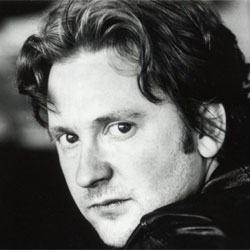The scarecrow wears a wire in the top field.
At sundown, the audiophilic farmer
who bugged his pasture unpicks the concealed
mics from his lapels. He’s by the fire
later, listening back to the great day,
though to the untrained ear there’s nothing much
doing: a booming breeze, a wasp or bee
trying its empty button-hole, a stitch
of wrensong now and then. But he listens late
and nods off to the creak of the spinal pole
and the rumble of his tractor pulling beets
in the bottom field, which cuts out. In a while
somebody will approach over ploughed earth
in caked Frankenstein boots. There’ll be a noise
of tearing, and he’ll flap awake by the hearth
grown cold, waking the house with broken cries.
Notes on the Poem
"His work engages with the commonplace and the overlooked ..." is just part of why the 2007 Griffin Poetry Prize judges were drawn to Paul Farley's poetry collection Tramp in Flames. What they go on to observe about Farley's work is what made the poem "The Scarecrow Wears a Wire" singular then ... and perhaps even more so now, several years later. The 2007 Griffin Poetry Prize judges go on to praise Farley's scrutiny in Tramp in Flames of "... the absurd and the catastrophic, the scientific and the mythic, in ways that make us stop and think again about what it is to be living in this particular world, at this particular moment in our history." The notion of a farmer - "audiophilic", no less - equipping his scarecrow to eavesdrop on the field he is guarding is rather amusing. What the scarecrow hears is, on one hand, pretty small and mundane and on the other, achingly exquisite and extraordinary. Especially lovely is: "a wasp or bee trying its empty button-hole, a stitch of wrensong now and then." It's both hilarious and wrenching when the farmer's "listening back to the great day" ends so abruptly. How has the meaning of this poem changed or deepened from when it was peering out at and listening to the world midway through the first decade of this millennium? How is it now pertinent in perhaps new ways now, at the end of the second decade of this millennium? The encouragement to listen closely to the little things still resonates ... but are there more questions about who is listening, using what kinds of tools in what kinds of milieus? Who, in fact, is the scarecrow, who is the farmer, and what will jolt us and make us "flap awake" ...? Farley's poem is still making us stop and think about what it is "to be living in this particular world, at this particular moment in our history", isn't it?
